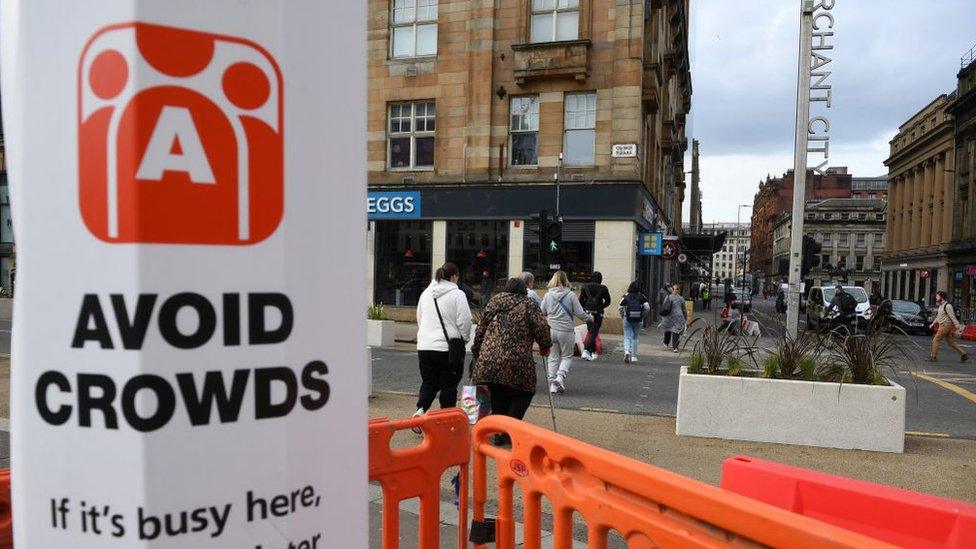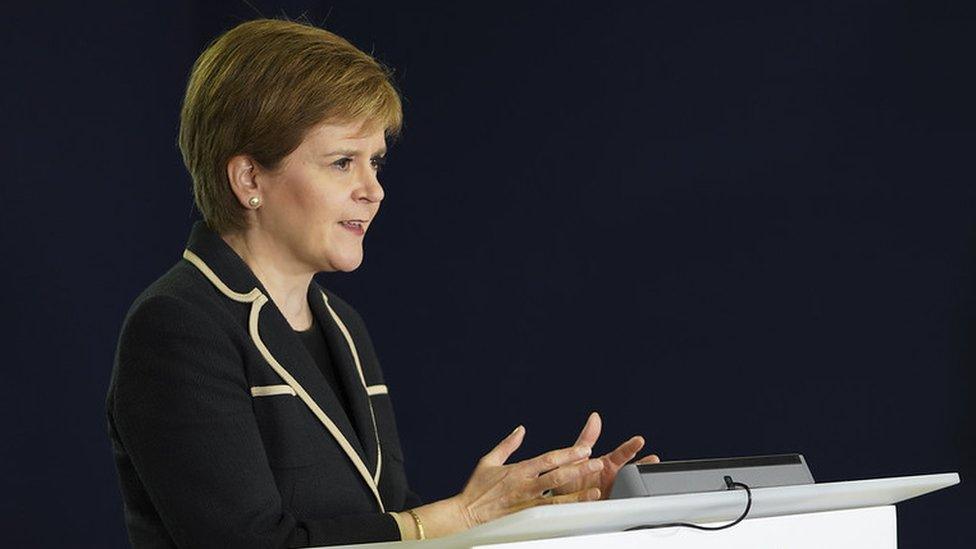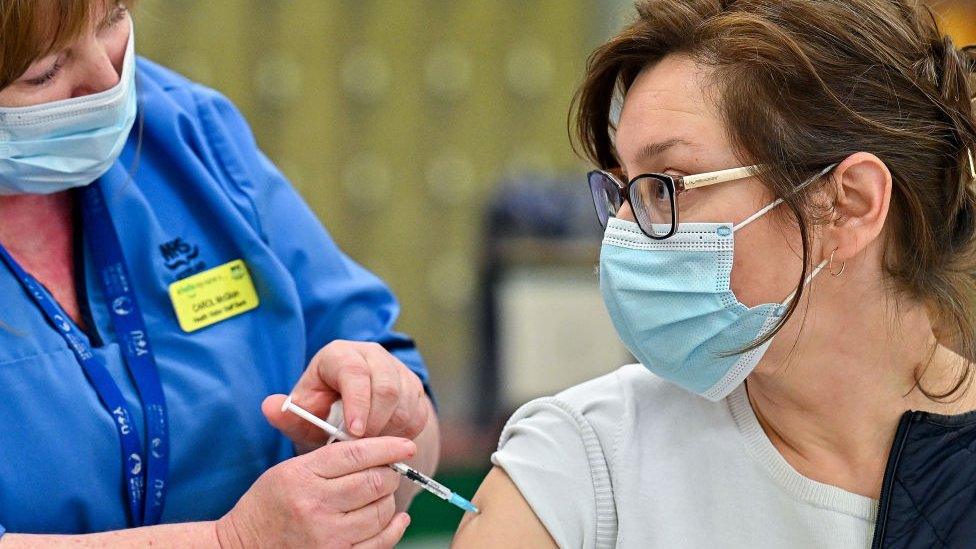Covid in Scotland: 'Cautious optimism' despite rising Covid numbers
- Published
- comments

Nicola Sturgeon has urged people not to "lose heart" despite Covid-19 case numbers in Scotland continuing to rise.
The first minister said cases across the country had doubled in the past fortnight.
And Glasgow remains in level three, with the seven-day average of new infections rising from 112 per 100,000 people to nearly 139 since Friday.
Ms Sturgeon said there had been a "bump in the road" out of lockdown due to the new Indian variant.
But she said there were "some positive signs" that case numbers may be stabilising in areas with outbreaks, such as Glasgow and East Renfrewshire.
And Ms Sturgeon said the vaccination programme could be working to "break the link" between rising case numbers and serious illnesses and deaths, saying this could mean tougher restrictions are no longer needed to control outbreaks.
Ms Sturgeon said there was a "rise in cases overall" across Scotland, with case numbers having doubled - albeit from a "very low base" - over the past 16 days.
She said the percentage of tests coming back positive was "creeping up" too.
There are particular concerns about Glasgow, where the number of cases continued to rise despite the city remaining under harsher restrictions than the rest of the country.
However, Ms Sturgeon said it was "important to recognise that the extensive public health efforts under way in Glasgow will take time to work through given the scale and complexity of the city".
And she said that "just in the last two days or so we think we may have started to see signs that case numbers in Glasgow are stabilising".
The first minister said the overall rise in cases was partly due to the easing of restrictions giving the virus more opportunity to spread, adding that new variants were "another important factor".
Ms Sturgeon said it was important to put the figures in context, with 97 patients in hospital now compared to more than 2,000 at the peak of the second wave in January.

Ms Sturgeon said increasing case numbers earlier in the pandemic had led "as night follows day" to increased hospital admissions and deaths within two to three weeks.
And while she said "significant degree of caution is still needed", this situation may be changing thanks to the vaccine - which could lead to a change in approach.
She said: "Increasingly we are monitoring whether and to what extent vaccination might be breaking that link between rising case numbers and significantly rising cases of serious illness and death.
"If that does prove to be the case, as we hope it will, we hope our response to this virus can increasingly evolve as well.
"In short, while care will still be needed, it might mean we don't have to react quite so aggressively with tough restrictions in the face of rising case numbers.
"Instead we hope we will be able to rely more on enhanced public health interventions like testing and vaccination, and good public health practices on the part of the public."
Vaccine uptake
A decision on restrictions in Glasgow will be made later in the week, with Ms Sturgeon saying this would be based not just on case numbers but also hospital and intensive care admissions.
There have also been concerns about the number of people coming forward for vaccine appointments, with around half of those booked in at one mass vaccination centre in Glasgow failing to turn up at the weekend.
Ms Sturgeon said there would be "more than one factor at play" behind this, ranging from address details not being up to date to younger people finding it harder to keep an appointment due to work.
But she stressed that "uptake rates are very high", saying that "this is a relative thing and we want to nip it in the bud".

Scottish Labour has urged the Scottish government to use "every means necessary" to get Glasgow out of lockdown, with leader Anas Sarwar calling for "urgent action now".
He said: "We can't have Scotland's largest city and one of the major economic engines of the country stuck in perpetual lockdown.
"To be frank the action so far has been timid, the communication has been poor and the decision-making has been inconsistent."
Mr Sarwar called for the government to seek help from the Army to speed up the vaccination programme, with Ms Sturgeon replying that there will be "no hesitation in doing that" if needed.
Meanwhile Scottish Green MSP Ross Greer said the Scottish government should deploy local surge testing "much quicker, before these local outbreaks are well under way".
He said: "We need to get a place where you can rapidly deploy that capacity, go door to door in an area that looks like it's beginning to have an outbreak and get that under control as quickly as possible."
Lib Dem leader Willie Rennie raised concerns about the take-up rate of vaccines, saying "many people" in his constituency had missed out on appointments due to the "clunky booking system".
Meanwhile the Scottish Conservatives called for new Health Secretary Humza Yousaf to make cutting waiting times an "urgent priority".
Health spokeswoman Annie Wells said: "While there has rightly been a focus within our NHS on tackling covid, the number of patients waiting for key diagnostic tests is extremely concerning.
"The SNP's new health secretary must tackle these waiting times as a matter of urgency before they completely spiral out of control. "